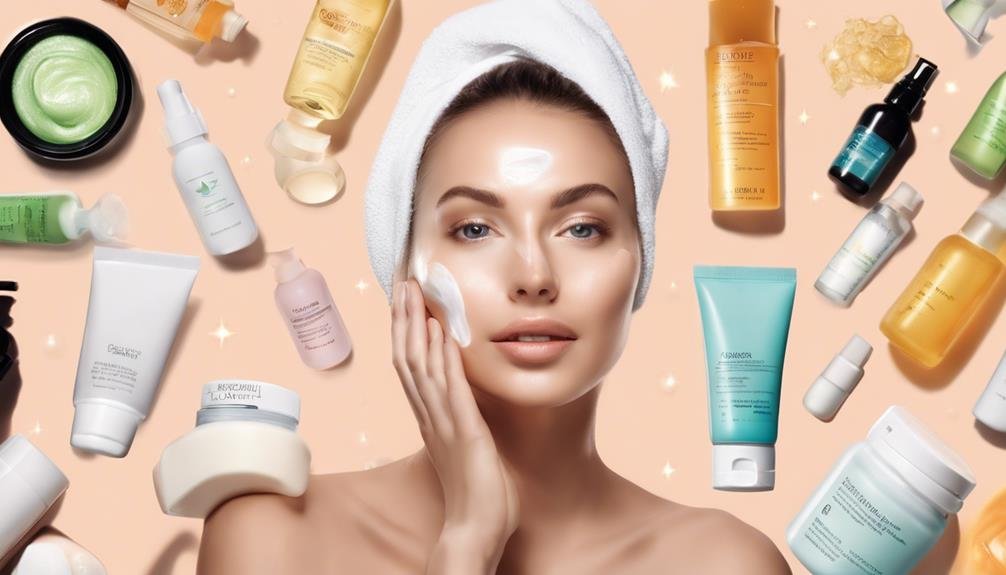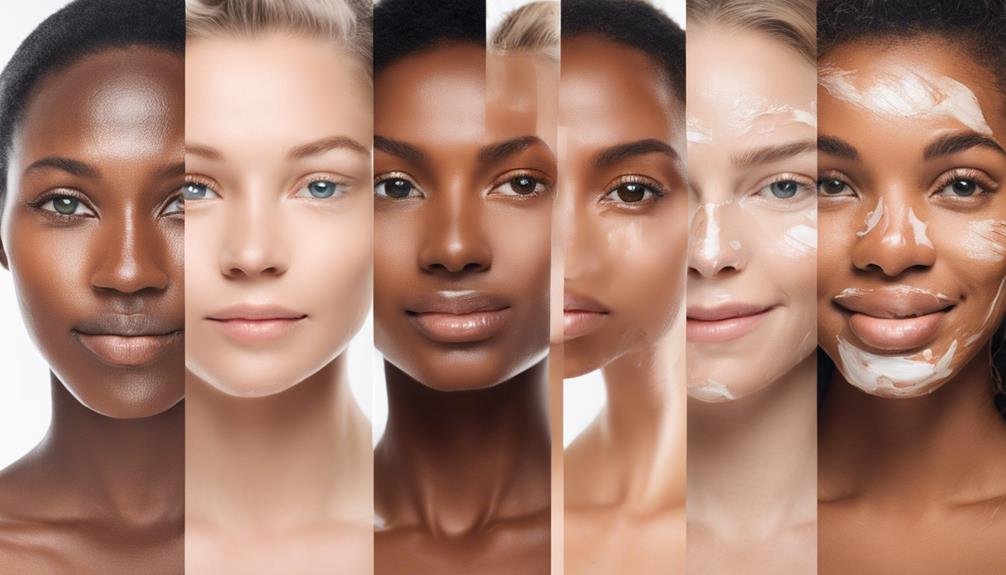Unlock the Secret to Healthy Skin
To achieve healthy skin, you must understand the fundamental principles of skincare that go beyond just surface-level treatments. By uncovering the secret to a radiant complexion, you will realize that it involves more than just applying products. It's about adopting a holistic approach that nurtures your skin from within, addressing both internal and external factors that contribute to its overall health. Stay tuned to discover the key elements that will revolutionize your skincare routine and unveil the true potential of your skin.
Key Takeaways
- Consistent skincare routine with cleansing, toning, moisturizing, and sunscreen.
- Stay hydrated for youthful, radiant skin.
- Use antioxidant-rich products to protect and repair skin.
- Choose suitable skincare products based on skin type.
- Prioritize stress management, sleep, and professional treatments for optimal skin health.
Importance of Skincare Routine

Having a consistent skincare routine is crucial for maintaining healthy skin. Your skin is the largest organ of your body and serves as a protective barrier against external factors like pollution, UV radiation, and bacteria. By establishing a regular skincare regimen, you can help protect and nourish your skin, keeping it looking radiant and youthful.
A skincare routine typically involves cleansing, toning, moisturizing, and applying sunscreen.
Cleansing removes dirt, oil, and impurities from your skin, preventing breakouts and dullness.
Toning helps to balance the skin's pH levels and tighten pores.
Moisturizing keeps your skin hydrated and supple, reducing the appearance of fine lines and wrinkles.
Lastly, applying sunscreen protects your skin from harmful UV rays, preventing premature aging and reducing the risk of skin cancer.
Consistency is key when it comes to skincare. By following a daily routine tailored to your skin type and concerns, you can maintain a healthy complexion and address any issues effectively. Remember, healthy skin is achievable with dedication and the right products.
Benefits of Hydration
Maintaining proper hydration is a fundamental aspect of skincare that significantly contributes to the overall health and appearance of your skin. Hydration plays a crucial role in keeping your skin looking youthful, radiant, and healthy. When your skin is well-hydrated, it appears plump, smooth, and vibrant. Dehydration can lead to a dull complexion, fine lines, and a lackluster appearance.
By drinking an adequate amount of water and using hydrating skincare products, you can help your skin retain moisture and maintain its natural elasticity.
Proper hydration not only benefits the outer layer of your skin but also impacts its inner layers. Water helps to flush out toxins, regulate body temperature, and promote circulation, all of which contribute to healthier skin. Additionally, hydrated skin is better able to repair itself and maintain a strong skin barrier, reducing the risk of issues like dryness, irritation, and inflammation.
Power of Antioxidants

To understand the power of antioxidants in skincare, it's essential to recognize their role in protecting your skin from environmental damage and promoting overall skin health. Antioxidants are like the superheroes of your skincare routine, fighting off harmful free radicals that can accelerate aging and damage your skin cells. By neutralizing these free radicals, antioxidants help prevent fine lines, wrinkles, and other signs of aging, keeping your skin looking youthful and radiant.
Common antioxidants found in skincare products include Vitamin C, Vitamin E, and green tea extract. These potent ingredients work together to strengthen your skin's defenses, repair damage, and brighten your complexion. Incorporating antioxidant-rich products into your daily skincare regimen can help improve skin texture, reduce inflammation, and enhance the overall health of your skin.
Choosing the Right Cleanser
When it comes to maintaining healthy skin, selecting the right cleanser is a crucial step in your skincare routine. Cleansers help remove dirt, oil, and impurities that can clog pores and lead to breakouts.
For those with oily or acne-prone skin, a foaming cleanser containing salicylic acid can be beneficial in controlling excess oil production and preventing blemishes. On the other hand, if you have sensitive skin, opt for a gentle, fragrance-free cleanser to avoid irritation.
Consider your skin type when choosing a cleanser. Dry skin may benefit from creamy or hydrating formulas that help retain moisture, while combination skin can benefit from a gel-based cleanser to balance oil production.
It's important to cleanse your face twice a day, in the morning and evening, to maintain healthy skin. Remember to follow up with a moisturizer suitable for your skin type to keep your skin hydrated and nourished.
SPF Protection Tips

For effective skin protection against harmful UV rays, incorporating SPF into your daily skincare routine is essential. Sunscreen with a broad-spectrum SPF of 30 or higher helps shield your skin from both UVA and UVB rays. To maximize protection, apply sunscreen generously 15 minutes before sun exposure and reapply every two hours, or immediately after swimming or sweating. Don't forget often-missed areas like your ears, lips, hands, and tops of your feet. Opt for water-resistant formulas if you'll be sweating or swimming. Remember to protect your lips with an SPF lip balm as well.
When using other skincare products, apply sunscreen as the final step in your morning routine. If using a moisturizer or makeup with SPF, ensure it provides adequate protection and consider layering with a dedicated sunscreen for added defense. Be mindful of the expiration date on your sunscreen to guarantee effectiveness.
Incorporating Serums and Oils
Enhance your skincare routine by incorporating serums and oils to address specific skin concerns and boost hydration. Serums are lightweight products packed with potent active ingredients designed to target specific issues like fine lines, dark spots, or dullness. They penetrate deeply into the skin, delivering a high concentration of beneficial components. Look for serums containing ingredients like hyaluronic acid for hydration, vitamin C for brightening, or retinol for anti-aging benefits.
On the other hand, facial oils are excellent for sealing in moisture and nourishing the skin. Oils rich in antioxidants and fatty acids can help repair the skin barrier, soothe irritation, and improve overall skin health.
When choosing a facial oil, consider your skin type and specific concerns. For oily skin, opt for lighter oils like jojoba or squalane, while dry skin may benefit from heavier oils like argan or rosehip.
Incorporating serums and oils into your skincare routine can provide targeted solutions for your skin concerns, leaving your skin looking radiant and healthy.
Understanding Skin Types

To truly optimize your skincare routine, it's essential to understand your skin type. Knowing whether you have dry, oily, combination, sensitive, or normal skin can help you choose the right products and create a tailored regimen.
Dry skin often feels tight and may appear flaky, requiring hydrating ingredients like hyaluronic acid.
Oily skin tends to produce excess sebum, leading to shine and potential acne, benefiting from products with salicylic acid or benzoyl peroxide.
Combination skin can be both oily and dry in different areas, needing a balanced approach.
Sensitive skin is easily irritated and benefits from gentle, fragrance-free products.
Normal skin is well-balanced and may only need basic maintenance.
Observing how your skin reacts to different products and environmental factors can also help determine your skin type.
Diet and Skin Health
Maintaining a healthy diet is crucial for promoting optimal skin health. The foods you consume play a significant role in the overall appearance and health of your skin.
Here are some key dietary factors to consider:
- Hydration: Drinking an adequate amount of water helps keep your skin hydrated from within, giving it a plump and radiant appearance.
- Antioxidants: Foods rich in antioxidants, such as berries, leafy greens, and nuts, help protect your skin from free radical damage and promote a youthful glow.
- Omega-3 Fatty Acids: Incorporating sources of omega-3 fatty acids like salmon, chia seeds, and walnuts into your diet can help reduce inflammation in the skin, improving conditions like acne and eczema.
Stress Management Techniques

Effective stress management techniques are essential for maintaining overall well-being, including the health of your skin. When you experience stress, your body releases cortisol, a hormone that can lead to inflammation and breakouts. To combat this, incorporating stress-reducing practices into your daily routine can significantly benefit your skin.
Try mindfulness meditation, deep breathing exercises, or yoga to help lower stress levels. Physical activity is another excellent way to reduce stress and improve skin health by increasing blood flow and promoting a healthy glow.
Additionally, ensure you prioritize self-care activities that bring you joy and relaxation, such as spending time with loved ones, engaging in hobbies, or simply taking a warm bath. Adequate sleep is also crucial in managing stress and supporting skin health, as it allows your body to repair and regenerate overnight.
Sleep and Skin Regeneration
During sleep, your skin undergoes a crucial process known as skin regeneration, where repair and renewal occur at a cellular level. This nightly rejuvenation is essential for maintaining healthy and vibrant skin. Here's why sleep is key for skin health:
- Increased Blood Flow: During sleep, blood flow to the skin increases, delivering essential nutrients and oxygen that support regeneration.
- Collagen Production: Sleep helps stimulate collagen production, a protein crucial for skin strength and elasticity.
- Stress Reduction: Adequate sleep reduces stress hormones like cortisol, which can contribute to skin issues like acne and wrinkles.
Ensuring you get enough quality sleep is a simple yet powerful way to support your skin's natural regeneration process. Aim for 7-9 hours of restful sleep each night to maximize the benefits for your skin and overall well-being.
Exfoliation for Radiant Skin

To achieve radiant skin, incorporating exfoliation into your skincare routine is crucial. Exfoliation helps remove dead skin cells, unclog pores, and promote cell turnover, resulting in a smoother, brighter complexion.
There are two main types of exfoliation: physical and chemical. Physical exfoliants, like scrubs or brushes, physically remove dead skin cells, while chemical exfoliants, such as AHAs or BHAs, work by dissolving the bonds between skin cells.
It's important to choose an exfoliation method that suits your skin type. If you have sensitive skin, opt for gentle exfoliants with round beads or enzymes. For oily or acne-prone skin, consider using salicylic acid to penetrate oil and clear pores. Remember, over-exfoliating can damage the skin barrier, leading to irritation and sensitivity. Start with exfoliating 1-2 times a week and adjust based on how your skin responds.
Incorporating exfoliation into your skincare routine can help reveal a more radiant and youthful complexion. Remember to follow up with a hydrating moisturizer and sunscreen to protect your skin after exfoliation.
Professional Skincare Treatments
When considering professional skincare treatments, consulting a dermatologist or licensed esthetician can provide valuable insights tailored to your skin's specific needs. These experts can recommend personalized treatments to address concerns and improve the overall health of your skin. Professional skincare treatments offer advanced solutions that can significantly enhance your skin's appearance and texture.
- Chemical Peels: A chemical peel can effectively exfoliate the skin, improve skin texture, and address concerns such as acne scars, hyperpigmentation, and fine lines.
- Microdermabrasion: This non-invasive procedure gently removes dead skin cells, promoting cell turnover and revealing a smoother, more radiant complexion.
- Laser Therapy: Laser treatments can target specific skin issues like sun damage, wrinkles, and unwanted hair, stimulating collagen production and rejuvenating the skin.
Frequently Asked Questions
Can Genetics Influence Skin Health?
Genetics can indeed influence skin health. Factors like collagen production, skin thickness, and oil production are all impacted by your genes. Understanding your genetic predispositions can help tailor your skincare routine for optimal results.
Does Pollution Affect Skin Condition?
Pollution can significantly impact your skin, leading to premature aging, inflammation, and skin conditions. UV radiation, particulate matter, and chemicals in the air can clog pores, cause oxidative stress, and weaken skin barriers. Protect your skin with antioxidants and proper cleansing routines.
How Does Climate Impact Skincare?
Climate plays a significant role in skincare. Harsh weather can strip your skin of moisture, leading to dryness and irritation. Hot and humid conditions may increase oil production, causing breakouts. Adjust your skincare routine to adapt to the climate changes for healthier skin.
Are Natural Ingredients Better for Skin?
Natural ingredients can benefit your skin by providing nourishing and gentle care. They often contain antioxidants, vitamins, and minerals that can help maintain skin health. Incorporating natural products into your skincare routine may promote overall skin wellness.
Can Stress Cause Skin Issues?
Yes, stress can cause skin issues like acne, eczema, and psoriasis. When you're stressed, your body releases cortisol, which can trigger inflammation and oil production. Managing stress through self-care practices can help improve skin health.
Conclusion
Now that you have unlocked the secret to healthy skin, remember that 64% of individuals believe that maintaining a consistent skincare routine is the key to achieving radiant and youthful skin. By incorporating hydration, antioxidants, sunscreen, and stress management techniques into your daily routine, you can nourish and protect your skin effectively. Don't forget to prioritize self-care and professional skincare treatments for optimal skin health and overall well-being. Your skin will thank you!








